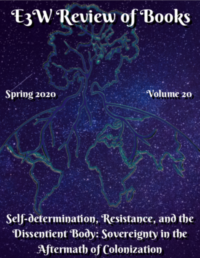This year’s theme for the Ethnic and Third World Literatures Review of Books, “Self-determination, Resistance, and the Dissentient Body: Sovereignty in the aftermath of colonization,” is an invitation to interrogate and celebrate scholarship that pays particular attention to the ways that indigenous and marginalized populations have resisted colonial formations of power in their respective communities. Central to this year’s review is work emerging from E3W alumni Naminata Diabate and Kirby Brown who discuss and problematize notions of sovereignty in emancipatory moments.
This issue includes seven sections:
The General Section: “Last night, a friend called. A Black man of Caribbean descent, one who rarely displays emotions if he can help it, through tears he said the words: “My father has COVID, and they are telling me he only has fifteen minutes of life left.” Immediately questioning the level of care given based on his father’s status as elderly, Black, and poor, his words cried out against the institutionalized systems of inequality inscribed on his father’s body… Read More
Be/Longing: The Flight and Fight for Home: “AH: So, we started this project—and really thinking about these ideas—at a time when if someone had said “there will be global pandemic in six months” I would’ve thought it was an aggressive marketing campaign for a new Matt Damon led sci-fi thriller. I haven’t let my apartment in two weeks, and I’m lucky.… Read More
Rethinking Cultural and Political Spaces: Intersectional Indigenous Hemispheric Dialogues: “In a globalized and interconnected world, it is crucial to center the knowledge(s), the saberes, from Indigenous and Black bodies that have historically been deemed as the subjects of study. Oppression transcends borders and notions of time that is why we focus on an intersectional Indigenous and Black hemispheric dialogue to build alliances among Indigenous and Black communities… Read More
Blackness, the Body, and Ontology:Perspectives On The “Fact” Of Racial Embodiment: “The fifth chapter of Martinican theorist Frantz Fanon’s canonical 1952 Black Skin, White Masks is entitled, in the original French, “L’éxperience vécue du noir.” While the most recent English edition of the text, translated by Richard Philcox, translates this title as “The Lived Experience of the Black Man,” earlier English editions used a much more provocative… Read More
Catastrophe, Contradictions, and Decoloniality: Caribbean Perspectives for a Global Scale: “The Caribbean has been one of the most sustained epicenters of coloniality in the Americas for various centuries. The aftermaths of such interrelationship with the world has been central to a myriad of works whose intentions are devoted to offering multiple possibilities of being. In this section, our reviewers highlighted six productions… Read More
Figuring Futurity: The Body as Speculative Frontier: Speculative: that which pertains to imagination, to theorization, to conjecture, to the contingent. But the word also brings to mind calculated risk, material consequence, and the valuation of space through time. What power do we…Read More
Infrastructure in the Aftermath of Colonialism: “In 1844, a British engineer responded to a report on the condition of slave ships with a troubling recommendation. A portable ventilator, he suggested, “might prove useful in removing the atmosphere before the sailors enter below deck, when it is in extreme condition, and also when they may have to be conveyed…Read More


